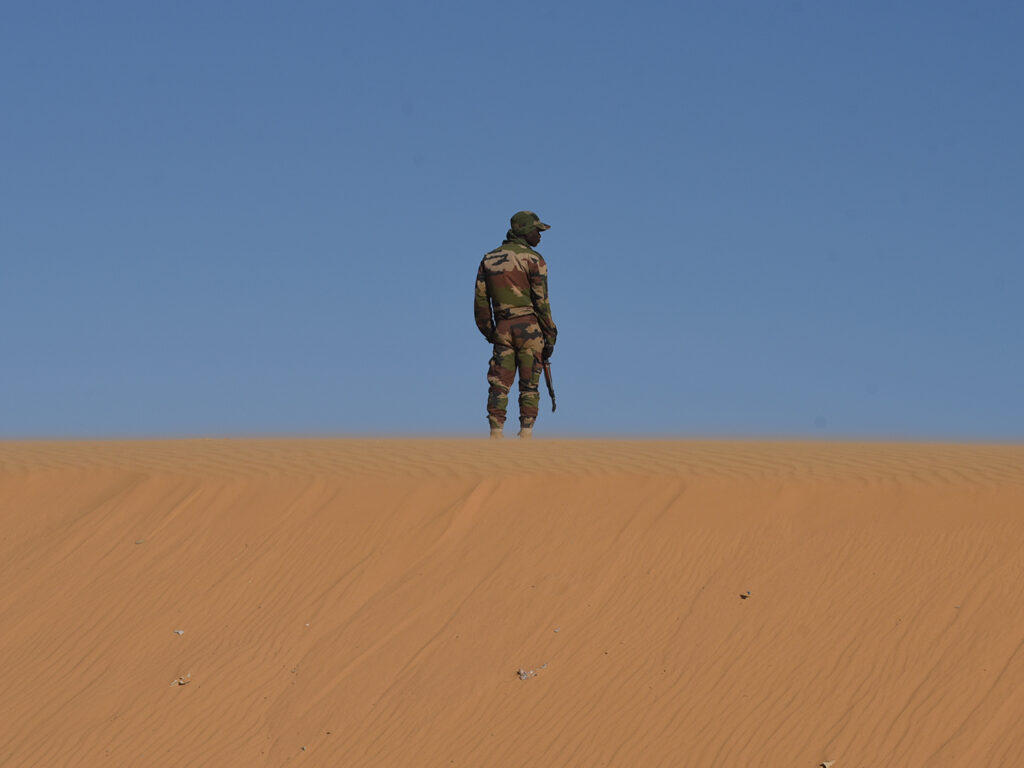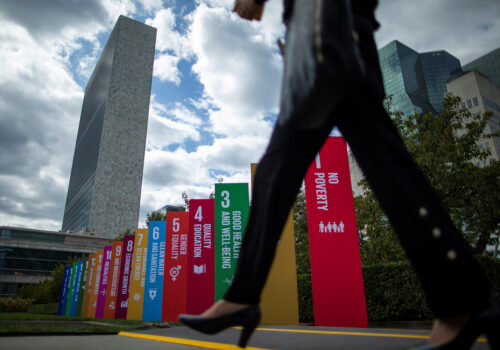Since 2022, Burkina Faso, Chad, Mali, and Niger have received at least a dozen total shipments of Turkish defense articles. This is just one of several signs of the Sahel’s growing engagement with Turkey. High-level diplomatic exchanges, along with the rumored operation of Turkish private military companies in the region, hint at a broader relationship. Washington may consider partnering with Turkey when it advances US interests—but it must approach any cooperation with clear eyes.
A broadening partnership
Turkey’s engagement in the Sahel predates the region’s security crisis, though it has grown in recent years. Trade between Turkey and Mali increased 32,000 percent over the previous two decades, from $5 million in 2003 to $165 million in 2022. Turkish firms have also played a key role in infrastructure development, constructing both an airport and a five-star hotel in Niamey, Niger. These relationships provide a strong base for defense cooperation.
Sahel-Turkey defense cooperation has steadily increased since 2018. What began as a five-million-dollar Turkish pledge to the now-defunct G5 Sahel Joint Force has matured into a broader, deeper partnership. Additionally, coups d’état in Burkina Faso, Chad, Mali, and Niger prompted the United States to halt its defense assistance, impeding these states’ ability to maintain and procure US equipment. Turkey became a more attractive partner as regional security deteriorated and Western assistance stagnated.
Military equipment sales are the cornerstone of Sahel-Turkey defense cooperation. They began in earnest in 2022, when Burkina Faso, Mali, and Niger each took delivery of Turkish Bayraktar TB2 drones. These drones rapidly proliferated across both the region and the continent, drawing comparisons to the AK-47 assault rifle because of their affordability, reliability, and ubiquity. These acquisitions heralded a shift in procurement, as Sahel states increasingly turned toward Ankara.
As time went on, drone sales continued apace. Chad obtained Anka-S drones in 2023 and Aksungur drones in 2024, while Mali expanded its TB2 fleet. Burkina Faso and Mali both procured Akıncı drones in 2024, signaling a shift toward more advanced systems. “Our defense capacity consists of the famous Bayraktar TB2s. We now have a new [drone] called Akıncı,” boasted Burkina Faso’s president, underscoring the centrality of Turkish equipment in Burkina Faso’s arsenal.
But it’s not just drones: Burkina Faso and Chad each acquired Turkish armored vehicles in 2022. Cooperation expanded further when Niger procured Turkish planes in late 2022, becoming the first export customer of an entirely Turkish-produced aircraft. Chad followed soon thereafter, acquiring the same aircraft in 2023.
Turkish equipment has addressed Sahel militaries’ acute security gaps and afforded them new capabilities. Turkish aircraft and drones offset ground mobility constraints by enabling militaries to surveil their territory and project force into contested areas. Turkish TB2 drones reportedly played a decisive role in Mali’s 2024 reconquest of Kidal, a rebel stronghold situated deep in the Sahara Desert.
Military equipment sales help grow Turkey’s relationships and influence. Partnering with Sahel states offers Turkey new avenues through which it can pursue its regional interests and bolster its image as a leader among Muslim-majority countries. A Turkish intelligence report from 2024 assessed that Niger was a “strategic partner,” capable of extending Ankara’s influence in Africa.
These relationships also enable Turkey to compete with rivals. Some analysts contend that Turkey’s outreach helps it outflank France and the United Arab Emirates. In addition, relations with Sahel states have helped Turkey constrain the Gülen movement, which the Turkish government labeled a terrorist organization and blames for the 2016 coup attempt. For example, Chad and Mali handed over control of Gülenist schools to a Turkish state-run organization in 2017.
Sahel states consider Ankara an important security partner. “We are taking a new course,” said the Malian minister of defense in November 2024. “[Turkish equipment] will help strengthen the territorial grid and neutralize threats wherever they are.” Burkina Faso awarded its highest state medal to the head of a Turkish defense company in 2023.
Defense cooperation may reach even further than equipment sales. In 2024, a report from Agence France-Presse indicated that SADAT International Defense Consultancy, a Turkish private military company, was deployed in the Sahel. It cited the Syrian Observatory for Human Rights as saying that one thousand Syrian personnel who had signed contracts with SADAT were deployed to Niger “to protect Turkish projects and interests.” (SADAT and the Turkish Ministry of National Defense denied these allegations). Africa Defense Forum, a magazine published by US Africa Command, reported that “Turkey said the fighters are in Niger to consult and guard Turkish interests, such as mines.” A deployment to Niger has not been confirmed.
Another report from Jeune Afrique suggested that SADAT had deployed to Mali and trained the country’s military in mid-2024. According to the report, SADAT personnel embedded with elite units loyal to the president and trained them to prevent coups d’état. This has not been verified, but, if accurate, would suggest that Turkey is employing new tools to deepen partnerships and address regimes’ desire for security.
There is also a small body of reporting indicating that Turkey is expanding its overt military presence. In February 2025, Military Africa reported that Chad granted Turkey control of a military base in the city of Abéché. If confirmed, this would be Turkey’s first base in the Sahel. It would also constitute a new element in defense partnerships that, to this point, have largely been driven by Turkish private industry and Sahel states’ demand for military hardware.
So what?
There are some conditions under which cooperating with Turkey could advance US regional objectives. Sahel states need defense assistance to fight a growing terrorist threat, which the United States often cannot provide. Turkish assistance does not face the same legal restrictions and thus fills urgent capability gaps. Turkish aircraft, armored vehicles, and drones improve force mobility and help militaries take the fight to terrorist strongholds. As terrorists expand operations, partnering with Turkey could help regional militaries manage the threat.
Turkey’s growing involvement in the region also presents opportunities to counter US adversaries. Turkish military equipment offers an affordable, high-quality alternative to Chinese or Russian products. In a similar fashion, SADAT could reduce states’ reliance on Russia’s Africa Corps, which has provided training and regime security to Burkina Faso, Mali, and Niger. SADAT offers a suite of similar services, and its deployment to Mali, if confirmed, would suggest that Mali’s president may be looking to move beyond Russian assistance.
That said, there are also risks in working with Turkey, and Washington must approach any partnership with clear eyes. The United States requires recipients of advanced military equipment to submit to end-use monitoring, but Turkey does not enforce recipients’ compliance with the law of armed conflict in the same manner. Moreover, private military companies operate under different rules of engagement than conventional militaries, underscoring the risks associated with possible SADAT deployments in the Sahel. Turkish defense assistance often comes with fewer asks than US assistance, and the United States may incur reputational harm if it chooses to partner with Turkey.
Partnering with Turkey is not a panacea for declining Western influence either. Ankara oscillates between cooperation and competition with Russia, frustrating European leaders. Turkey has been accused of fueling anti-colonial sentiment in Africa; this once irritated the French president who, in late 2020, alleged that Ankara and Moscow had inflamed anti-French sentiment in Africa. The European Union has since expressed interest in partnering with Turkey to “generate a wide international coalition that can support [the Sahel].” Even so, Turkey’s foreign policy suggests that it may not share the West’s precise goals.
Any partnership with Turkey must be carefully calibrated and closely monitored. Partnership has the potential to advance some US objectives, but it alone cannot resolve the broader challenges posed by terrorism’s dramatic expansion and states’ pivot from the political West. The United States must be prepared to work with Turkey where objectives align, while preserving the capacity and flexibility to act independently in pursuit of its vital interests.
Jordanna Yochai is an analyst whose research examines West African security, with prior experience in the US Department of Defense.
The positions expressed in this article do not reflect the official position of the US Department of Defense. The US Department of Defense does not endorse the views expressed in hyperlinked articles or websites, including any information, products, or services contained therein.
Further reading
Mon, Jun 30, 2025
Africa’s game revolution is loading
AfricaSource By Tom Bonsundy-O’Bryan
With the right investment, infrastructure, and visibility, Africa won’t just be a player in the global gaming industry—it will be the one pushing it forward.
Fri, Jun 27, 2025
In Seville, leaders have an opportunity to tackle systemic global inequality. Will they take it?
AfricaSource By
Achieving the Sustainable Development Goals at the global level increasingly depends on progress being made in Africa.
Fri, Jun 27, 2025
Don’t leave Africa behind in sports sustainability—put it first
AfricaSource By
The hosts of the upcoming Olympic Games and FIFA World Cup are committing to sustainability goals inside their countries. But achieving a sustainable sports legacy will take a global approach.
Image: A Nigerien soldier on a sand dune near the Algeria. Photo by Mehdi Chebil/Hans Lucas via Reuters Connect.



